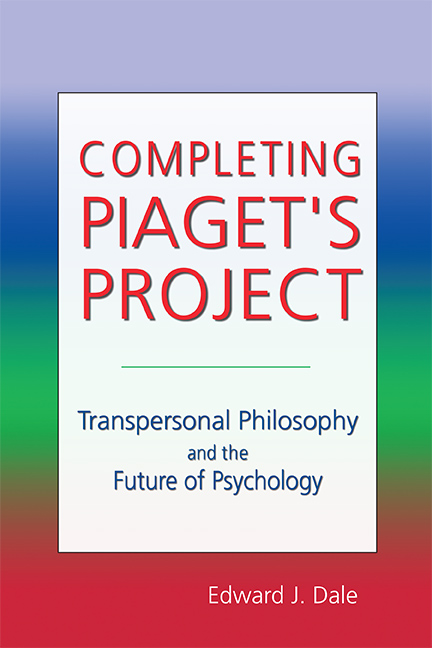
"Dale’s Completing Piaget’s Project is a groundbreaking book that deserves to be not only widely read and discussed, but also used as textbook in courses on transpersonal psychology, developmental theories, and the philosophy of religious pluralism." Jorge Ferrer, CIIS, in Journal of Transpersonal Psychology"Ed Dale has written a fascinating book which should be of interest to those who are serious in studying transpersonal and spiritual development."—Allan Combs, Doshi Professor of Consciousness Studies, CIIS
"Its reach, range, and originality are indeed, impressive. Dale’s neo-Piagetian understanding of spirituality, very much in the tradition of the Bergson who so inspired the young Piaget, warrants the attention of all those concerned with the 'living’ foundations of transpersonal psychology and their further development."—Harry T. Hunt, Journal of Transpersonal Psychology
Drawing on rare sources, many of which have not previously been translated into English, the view of Piaget and his work that emerges in this book is very different from the atheistic view of Piaget that is commonly held in psychology and transpersonal psychology. In both his early and later career Piaget held to an evolutionary view of spirituality reminiscent of the work of Hegel and Bergson. The spiritual future could be precursed by the individual in this life through the experience of "immanence." Piaget underwent a spiritual emergency in adolescence, reported in early autobiographical writing, in which he encountered an array of experiences described in Eastern and Western mystical canons. For reasons discussed in this book, Piaget attempted to conceal his spiritual inclinations while tacitly confirming them in informal exchanges. This book not only describes the spiritual aspects of Piagetӳ life and work, it also builds bridges to both the contemporary transpersonal project and to contemporary psychology, by extending Piagetӳ own ideas to shed new light on transpersonal psychology and transpersonal philosophy, and on the future orientation of general psychology. The book validates the transpersonal project by showing its concerns to be germane to psychologyӳ most influential figure. The reader will learn as much about the history, present, and future of transpersonal thought as they do about Piaget.
"This is a dense, demanding, and rewarding read, reframing as it does the seminal work of Jean Piaget beyond its generally perceived atheism.... This is the Piaget unknown to psychology who was also making important contributions to biology, many of which have since been validated by more recent systemic models.... In the final analysis, the spiritual must incorporate the findings of modernity, which the author find plausible largely because of adaptive complex systems theory restoring a sense of directionality to our view of life.—Network Review, Autumn 2015.





